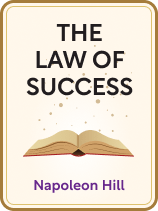

This article is an excerpt from the Shortform book guide to "The Law of Success" by Napoleon Hill. Shortform has the world's best summaries and analyses of books you should be reading.
Like this article? Sign up for a free trial here.
Have you ever had a thought or idea so outlandish that you wondered where it could have come from? Where do the contents of our subconscious come from?
According to Napoleon Hill, the author of The Law of Success, your subconscious mind receives all of your thoughts and ideas through its connection to the higher consciousness, which permeates and connects all matter in the universe. Through this connection, higher consciousness transmits ideas and guides your subconscious thoughts.
Here’s how your subconscious mind receives ideas and shapes the way you think.
How Your Subconscious Mind Receives Thoughts and Ideas
In his book The Law of Success, self-help author Napoleon Hill explains that your subconscious mind receives all of your thoughts and ideas through its connection to higher consciousness. Though higher consciousness is the source of all knowledge (because it contains the collective thoughts of humanity), your subconscious mind can only access thoughts and ideas within higher consciousness that are consistent with your habitual thoughts.
Example: You’re a struggling writer and you habitually feel insecure about your creative abilities. Your continual lack of self-confidence imprints upon your subconscious mind, causing it to conclude that you aren’t creative enough to become a successful writer. Even though higher consciousness contains an infinite number of creative ideas, any one of which could potentially help you succeed as a writer, your subconscious mind can’t access them. Instead, it only attracts ideas that make you further doubt your creative abilities.
| How Cognitive Biases Influence Your Thoughts and Ideas While research hasn’t yet supported the argument that you receive your subconscious thoughts from higher consciousness or that your ideas are restricted to only those that are consistent with your habitual thoughts, there is evidence that your subconscious mind shapes the way you think. According to psychological research, many of your thoughts are influenced by cognitive biases. Cognitive biases are the result of your brain’s attempt to make quick judgments based on your past experiences (the conclusions your subconscious mind forms about you), and they shape the way you think about and perceive your environment. There are many different types of cognitive biases, and each of them influences your thoughts in different ways. Two common cognitive biases are 1) confirmation bias, the tendency to only think about information that confirms and reinforces your opinion, and 2) negativity bias, the tendency to only think about the negative aspects of your experiences. The example above demonstrates how both of these biases may limit your ability to come up with creative ideas. Your confirmation bias influences you to only focus on your struggles as a writer and ignore your successes, which reinforces your conclusion that you’re a bad writer. Likewise, your negativity bias causes you to see all your writing ideas in the worst possible light. As a result, both biases reinforce your lack of self-confidence and your creative block. |

———End of Preview———
Like what you just read? Read the rest of the world's best book summary and analysis of Napoleon Hill's "The Law of Success" at Shortform.
Here's what you'll find in our full The Law of Success summary:
- How your subconscious mind creates your life experiences
- Why the only way to achieve success is to realign your habitual thoughts
- Actionable advice on how to retrain your subconsciousmind for success






